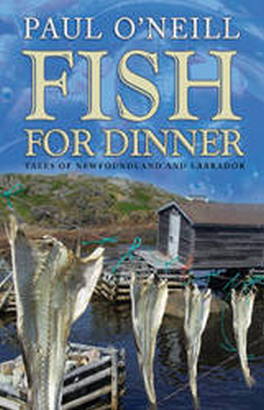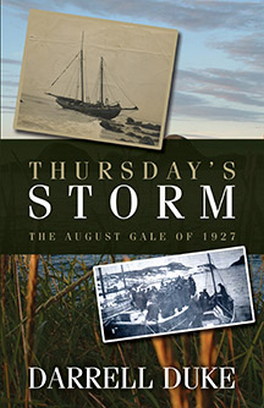 Germany has the Brothers Grimm, and now Newfoundland has Paul O’Neill. Paul O’Neill has been collecting favourite stories from around the world since high school. In Fish for Dinner, he has taken tales of long ago that grew out of the world’s oral traditions and set them in communities around Newfoundland and Labrador. The result is a wonderful collection of tales of ghosts, witches, fairies, and magical happenings for the adult reader. Included in this volume are stories from: L’Anse aux Meadows — The One Hundredth Wife Corner Brook — How Finbar Beat Old Scratch Harbour Grace — The Wisdom of Solomon Petty Harbour — Skipper and the Red Fox Nain — The Boy Who Never Said A Word Fogo — The Good Merchant . . . and many more!
Germany has the Brothers Grimm, and now Newfoundland has Paul O’Neill. Paul O’Neill has been collecting favourite stories from around the world since high school. In Fish for Dinner, he has taken tales of long ago that grew out of the world’s oral traditions and set them in communities around Newfoundland and Labrador. The result is a wonderful collection of tales of ghosts, witches, fairies, and magical happenings for the adult reader. Included in this volume are stories from: L’Anse aux Meadows — The One Hundredth Wife Corner Brook — How Finbar Beat Old Scratch Harbour Grace — The Wisdom of Solomon Petty Harbour — Skipper and the Red Fox Nain — The Boy Who Never Said A Word Fogo — The Good Merchant . . . and many more!
If you are told this all happened very long ago, you will perhaps be more apt to believe it really is true than if you were told it happened yesterday, or even the day before. In that time, whenever it was, a young and handsome seaman named Pythagoras Goode served as captain of the Newfoundland brigantine Springbird, a three-masted sailing vessel. During the autumn and winter months, she was chartered to a fish exporter in Harbour Grace and plied the sea lanes of the North Atlantic, carrying fish to far-off markets in such Caribbean islands as Barbados and Jamaica. On the return voyage, she would carry rum and molasses.
One day in late August, the Springbird was tied up at the dock in Bay de Verde, a large and prosperous fishing community at the northern tip of Conception Bay. Her holds were being loaded with dry, salted cod, packed in wooden puncheons in Mr. Nail’s fish store for shipment. Captain Goode and his wife, Hebe, had invited the brig’s owner, Mr. Nail, the local parson, and a magistrate who was conducting a circuit court, to come on board for dinner. Hebe Goode gave the ship’s cook the afternoon off as soon as the dishes were cleared away, from the noontime meal. She wanted the galley to herself to prepare the dinner for their guests. It was not unusual at the time for the wives of ocean-going captains to sail with their husbands on long voyages. When at sea, Mrs. Goode would sometimes take over part of the galley and prepare special repasts for her husband and crew. She knew the galley as well as she knew the kitchen in her little house.
Hebe Goode set to work washing vegetables and making a dessert with rhubarb she had brought with her from her garden. Meanwhile, one of the young sailors was sent off in a rodney to jig her a cod for the main course. She thought there was nothing as nice as fresh fish stuffed with a bread and savoury dressing and baked in the oven. The afternoon was turning into one of those beautiful August days when the hot sun seems to linger as it crosses the sky. It smiled radiantly on the tranquil harbour like a doting parent beaming on a much-loved child. The warmth of its rays warmed Captain Goode’s bones as he stood at the rail of the Springbird. He was lulled by the sounds of the wharf hands and crew loading the ship’s holds with cargo. Their coarse cries told him it would soon be time to cast off the hawsers, spread the sails, and head out into the breezes and gales of the restless West Atlantic. He looked forward to another voyage to the sapphire and emerald calm of the Caribbean’s waters. Today, however, he would have to wait until after the visitors were served dinner.
Pythagoras Goode listened to the hypnotic voice of his wife, coming through an open porthole, telling the galley boy to wash the rhubarb carefully before he cut it in pieces. Captain Goode scanned the shoreline through half-closed eyes, guarding against the glare of sunlight that deluged his world with light and burned away what little was left of the morning mist. The day was hot for late summer, and Captain Goode began to perspire. He dropped his glance to the waters at the side of his ship. They were very clear and extremely inviting. When he was a boy, on hot days such as this, he liked nothing better than to strip off his clothes and dive into the harbour for a swim. The chill that seemed to linger all year in Conception Bay never bothered him then. In time he became a powerful swimmer.
Leaning over the rail, Pythagoras Goode could see clearly the green rocks that littered the bottom of the harbour. Tomcods and the odd flounder darted among them. Since his first days as a young seaman, he had always felt instinctively drawn to the shadowy forms of fish under water. The tomcods were full of mystery and a source of fascination. He often wondered what it would be like to be a fish. He imagined it would be nice to live in a place where water filtered out the ugly sounds of the workaday world – winches turning, men heaving and shouting, the shrill voices of children at play. The more he thought about it, the more the young ship’s officer felt himself drawn to the profound beauty beneath the surface.
Unnoticed by anyone, Captain Goode undressed and dived down into the harbour. At first he was momentarily numbed by the shock of the cold water. The temperature of his body soon dropped, and he became accustomed to the chill. He was lying face up on the bottom when something hit the water above him. It was a pan of scraps thrown over the side by the galley boy who was the cook’s helper. Herring gulls and other seabirds immediately swooped down to snatch up the scraps in their beaks.
The boy blinked and looked over the side a second time. Was that the captain lying on the rocks beneath the vessel? Puzzled, he climbed on a coil of rope to get a better view. When he peered down again, he saw nothing but the ubiquitous tomcods and flounder. While the gulls were snatching at Mrs. Goode’s galley scraps, the captain swam quickly under the brigantine’s keel. The boy with the scrap pail decided the sun’s rays had played a trick on him and what he thought was Captain Goode must have been an illusion created by shadows.
The skipper was still hiding under the keel when a very old sculpin swam up and stared him in the eye. The sculpin is a mean looking fish, ugly and spiny. Because she was so old, this sculpin looked meaner and more spiny than most, yet when she spoke, her voice was kind, like that of a much-loved great aunt or grandmother. She trembled a little with age.
“My dear man,” the sculpin said, “you are quite out of your element down here among us fish. You must go up for air immediately or you will surely drown.”
This caused Captain Goode to reflect that the old saying was certainly true: you can’t judge a book by its cover, nor a fish by its skin. “How I envy you,” he said through a string of air bubbles, “having gills that let you breathe under the water.”
The sculpin’s wide mouth drew back in a smile. “You should never envy another,” the ugly old fish said, “unless you have lived that other’s life. I possess magic that can grant you the ability to breathe under water like a fish for an hour or so, that you might know what it is to be one of us. What kind of fish would you like to be?”
How could he tell this kind old creature he would prefer to be a halibut darting through the ocean, or a beautiful salmon, instead of an ugly sculpin swimming along the bottom?
Staring him in the eye, the old sculpin laughed. “I see what you are thinking, sir. I will not turn you into a sculpin, but into a fish of your choice.”
“I wonder if it would be possible to become something larger than a sculpin?” he said, expelling the last of the air in his lungs in bubbles that floated up to the surface.
“If you want to inhabit a body bigger than mine, so be it!” the sculpin exclaimed and, with a flick of her tail, she swam three times around the captain’s waist.
He felt himself grow faint and thought perhaps he was drowning. Moments later, he regained his senses to find he was breathing through gills in his neck. His eyes were no longer in the front of his face but on either side of his head. His body was that of a halibut. In his transformation, the wedding ring he wore on one of his fingers had come off and was lying on the bottom. So as not to lose it he swam down, took it in his mouth and hid it beneath his tongue.
“Before I leave, let me give you a few words of warning,” the old sculpin said. “The ocean is not without dangers. You must keep an eye out for larger fish that will want to swallow you, such as sharks.”
“There are people like that on land, and countries too. They go to war and try to swallow up each other.”
“No, my son. They are not like fish. People and countries attack those who are simply not of their tribe or race or those who do not think as they do, because of hatred and greed. That is evil. There is no evil in the ocean. Fish attack and kill other fish for need, not greed. It is the law of nature. If a shark should kill and eat me, it would not be out of hatred or greed but because the shark is hungry.”
Pythagoras was beginning to see the difference.
“I warn you also to be aware of human hazards such as nets and fishing lines. Young fish caught in these devices are inexperienced and foolish. Old fish are caught in them because age makes us overly confident and we forget to use caution. I am sure you know all about the peril of fish hooks, having caught many an unwary fish yourself with a hook and line.”
Pythagoras Goode, now Pythagoras Halibut, sighed with remorse when he recalled the many fish he caught by hook and line.
“Remember to conduct yourself with wisdom under water,” warned the sculpin. “A lack of caution could mean the death of you.” Having completed her warning, the venerable sea creature flicked her tail once more as she swam away.
Fish for Dinner is a compilation of old tales with a Newfoundland twist. Like a view of Hans Christian Andersen's fairytales, with our culture, words and what's familiar intertwined with fantasy.-- Current Magazine --
The stories in Fish for Dinner are well-written, with great descriptive passages.-- The Chronicle Herald --
Fish for Dinner is a new Newfoundland classic. This wonderful collection of tales should grace every Newfoundlander's book shelf.-- Atlantic Books Today --
A first-rate collection, full of compelling, often magical, narratives.-- Newfoundland Quarterly --

 Germany has the Brothers Grimm, and now Newfoundland has Paul O’Neill. Paul O’Neill has been collecting favourite stories from around the world since high school. In Fish for Dinner, he has taken tales of long ago that grew out of the world’s oral traditions and set them in communities around Newfoundland and Labrador. The result is a wonderful collection of tales of ghosts, witches, fairies, and magical happenings for the adult reader. Included in this volume are stories from: L’Anse aux Meadows — The One Hundredth Wife Corner Brook — How Finbar Beat Old Scratch Harbour Grace — The Wisdom of Solomon Petty Harbour — Skipper and the Red Fox Nain — The Boy Who Never Said A Word Fogo — The Good Merchant . . . and many more!
Germany has the Brothers Grimm, and now Newfoundland has Paul O’Neill. Paul O’Neill has been collecting favourite stories from around the world since high school. In Fish for Dinner, he has taken tales of long ago that grew out of the world’s oral traditions and set them in communities around Newfoundland and Labrador. The result is a wonderful collection of tales of ghosts, witches, fairies, and magical happenings for the adult reader. Included in this volume are stories from: L’Anse aux Meadows — The One Hundredth Wife Corner Brook — How Finbar Beat Old Scratch Harbour Grace — The Wisdom of Solomon Petty Harbour — Skipper and the Red Fox Nain — The Boy Who Never Said A Word Fogo — The Good Merchant . . . and many more!





















